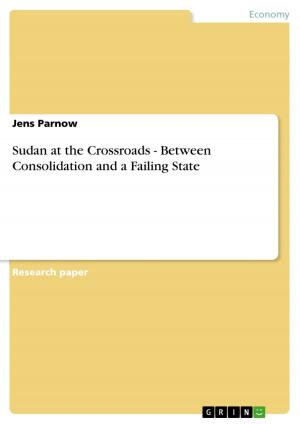Britain - A classless society? The development and influence of the middle class in Great Britain
A classless society? The development and influence of the middle class in Great Britain
Nonfiction, Reference & Language, Study Aids, ESL, Foreign Languages| Author: | Anja Reiff | ISBN: | 9783638517669 |
| Publisher: | GRIN Publishing | Publication: | July 5, 2006 |
| Imprint: | GRIN Publishing | Language: | English |
| Author: | Anja Reiff |
| ISBN: | 9783638517669 |
| Publisher: | GRIN Publishing |
| Publication: | July 5, 2006 |
| Imprint: | GRIN Publishing |
| Language: | English |
Seminar paper from the year 2003 in the subject English Language and Literature Studies - Culture and Applied Geography, grade: 1,3-1,5, University of Potsdam, 14 entries in the bibliography, language: English, abstract: Great Britain has often been described as a very class-conscious society. Some people even proclaim the British as 'obsessed with class' and Britain as a 'very rigid society'1. Compared to other countries such as Germany this statement seems true. These different states of society are due to 'individual' developments and national attitudes towards class e.g. whereas in Britain the Industrial Revolution already had begun, Germany still suffered from feudalism. Apart from those historical developments class gains in almost every modern nation another emphasise. In Britain the recent years opened up the discussion on a classless society. Politicians more and more referred to this vision of a society in which the rigid divisions between social groups are reduced and everyone benefits from the wealth and efforts of modern life. In this paper I firstly want to discuss general ideas and definitions concerning the term 'class' and especially the 'middle class', which is my main topic. Secondly, I want to draw the attention to historical developments and therefore, how the middle class succeeded to gain more influence in politics and economy. Finally, I will concentrate on the recent debate on the question: 'Is Britain a classless society?'. In this part I will try to compare different opinions and arguments in present-day publications.
Seminar paper from the year 2003 in the subject English Language and Literature Studies - Culture and Applied Geography, grade: 1,3-1,5, University of Potsdam, 14 entries in the bibliography, language: English, abstract: Great Britain has often been described as a very class-conscious society. Some people even proclaim the British as 'obsessed with class' and Britain as a 'very rigid society'1. Compared to other countries such as Germany this statement seems true. These different states of society are due to 'individual' developments and national attitudes towards class e.g. whereas in Britain the Industrial Revolution already had begun, Germany still suffered from feudalism. Apart from those historical developments class gains in almost every modern nation another emphasise. In Britain the recent years opened up the discussion on a classless society. Politicians more and more referred to this vision of a society in which the rigid divisions between social groups are reduced and everyone benefits from the wealth and efforts of modern life. In this paper I firstly want to discuss general ideas and definitions concerning the term 'class' and especially the 'middle class', which is my main topic. Secondly, I want to draw the attention to historical developments and therefore, how the middle class succeeded to gain more influence in politics and economy. Finally, I will concentrate on the recent debate on the question: 'Is Britain a classless society?'. In this part I will try to compare different opinions and arguments in present-day publications.















